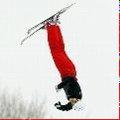It is almost fitting that freestyle aerials skier Jeret Peterson's signature jump is called the Hurricane. The jump (off a man-made snow-covered ramp) features three flips and five twists and is widely regarded as one of the most difficult on the World Cup circuit. But its meteorological namesake could just as easily be an emblem for Peterson's life off the slopes. His sister was killed by a drunk driver when Peterson was just five years old. In 2003 he revealed that he was a victim of sexual abuse by a person he refuses to name. Then in 2005, just a few months before the Turin Games, Peterson saw his roommate, Trevor "Trey" Fernald, shot himself to death. The skier tried to handle the situation on his own, but he told VOA sports that he soon turned to alcohol.
"I didn't really feel like saying 'poor me, this happened to me. ' No. I had the choice to make the situation what it was, and rather than going to counseling I was hanging out with Bud Light [beer] and Jack Daniels [whiskey]," said Jeret Peterson. At the 2006 Turin Olympics, Peterson attempted the Hurricane in the finals and lost a medal because he missed it. A more conservative leap would have earned the American a medal.
As had become his habit, Jeret Peterson tried to deal with the disappointment by using alcohol. But this time it led to a very public dismissal from Turin. After a night of post-competition partying in the Italian city, Peterson and his best friend from Boise, Idaho got into an alcohol-fueled bar fight. The police came to break up the melee, and the U.S. Olympic Committee sent Peterson home early.
The now 28-year-old Peterson says he learned some valuable - if expensive - lessons from his time in Turin.
"The person that I am now, versus the person that I was back then - you could not pay me $10 million to go back to that person," he said. "I was young, I was cocky, I thought I had already won that gold medal before I even jumped. And I got spanked hard. It's something that I am glad that I did not win, because I would not be the person that I am now." The American skier found himself inundated with critical e-mails and letters because of his embarrassing finish and exit from Turin. He decided to step away from the sport, and it was during that time that he realized he needed to change.
"I think the big thing is that I hit rock bottom," said Peterson. "And that's the thing that they say every alcoholic, every addict, every person with an issue like that has to do. And I was pretty fortunate that my rock bottom did not cost me my life and did not cost anybody else's life, and I am still able to do what I love." Jeret Peterson did not go through treatment or rehabilitation - he just quit. When he returned to competition last season, he won the second World Cup meet that he entered. He was sixth in a World Cup event at the 2010 Vancouver Olympics venue and finished eighth at the World Championships.
Peterson says even in his darkest time, he never lost the love for skiing.
"I have always given 110% to anything I do," he said. "But I also feel that a big part of being successful is being able to walk away. Leaving things at the office, if you will. And that's exactly what I needed to do. I really wanted to focus on many other things in my life." That focus has benefited Peterson on the slopes - he landed a pair of quadruple twisting jumps to qualify for the U.S. Olympic team at Steamboat Springs, Colorado, in December. The Vancouver Games will be his third straight Olympics. And this time, Jeret "Speedy" Peterson is looking forward to competing with a clear head and giving his all - including his signature Hurricane jump - to bring home Olympic gold.

